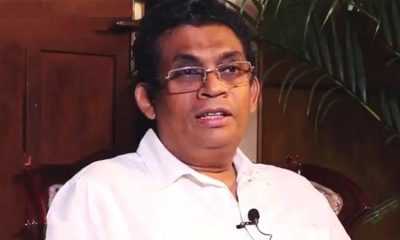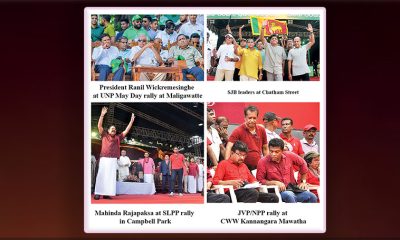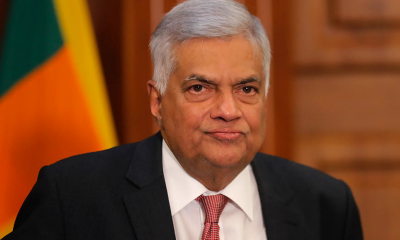Features
Presidential insecurity in spite of power and performance
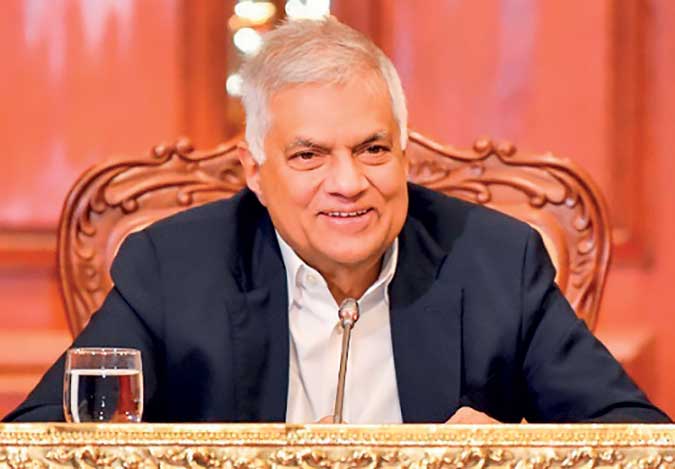
by Rajan Philips
The political posturing over debt ‘optimization’ is just that. Posturing! Those who were waiting in anticipation for the President to order a crewcut to the local banks, are now howling that the banks have been let off with ponytails of profits while the working classes were not given the same concession by leaving their hard earned EPF contributions similarly untouched. A loss of depositor confidence in the banks, which any haircut could have triggered, would have been a far worse and instantaneous disaster than Gotabaya Rajapaksa’s organic fertilizer fiasco. The government to its credit would seem to have avoided it quite neatly.
Equally, the adjustments to the EPF’s returns on its bond savings will play over the long run and will have little or no impact on immediate retirees, or others retiring in the short term or even the medium term. In the long term, not to forget the Keynesian wisdom that most of us will be dead, the economy is supposed to be doing well for the living. That’s the premise for policy. There is no policy making assuming perpetual doom.
The politics over debt is turning out to be a victory for President Wickremesinghe. Once again the opposition in parliament is left playing catch-up. This has been the case ever since Ranil Wickremesinghe became caretaker President. Yet, for all his Teflon performances on the economic front, the President remains politically vulnerable. Unlike other politicians, however, he is quite aware of his vulnerability politically and more so electorally.
To wit, his indefinite postponement of the local elections, maneuvering the timing of the presidential election to his advantage, and playing chess games with provincial and parliamentary elections. He keeps most people guessing and his potential adversaries confused. Add to all this the recent changing of guards in the Election Commission under his direct oversight. Clever and proactive as these moves are, they are also indicative of the level of political insecurity the President harbours in spite of the near-monarchical powers that he effortlessly wields.
External Validation
Evidence of this insecurity manifested itself quite patently in the revelations President Wickremesinghe made in London, in the course of a seemingly soulmate chat with the former Canadian Prime Minister and arch conservative Stephen Harper. The President was en route to Paris for the global debt summit convened by middle-of-the-road French President Emmanuel Macron. He stopped over in London to attend the 40th anniversary event (June 20-21) of the International Democrat Union (IDU), whose current Chairman is Stephen Harper.
The fact that the President chose to reveal details about the last moments of the Gotabaya Rajapaksa presidency and the early moments of his own at the anniversary event of the IDU says a great deal about Ranil Wickremesinghe’s political sympathies and his craving for external validation. The transcript of the conversation released by the PMD in Colombo shows Mr. Harper confirming their ideological affinities straddling the global north-south divide and their mutual deification of the free run marketplace.
The International Democratic Union is the mutual admiration society of the Global Right that was created in 1983 at the height of the Reagan-Thatcher era in Western politics. The membership includes centre-right and rightwing parties, but the organization leans far more right than centre-right. The founding members were 19 conservative parties, 18 of whom were from the West and one from Japan. Prominent signatories included Margaret Thatcher, Helmet Kohl and Jacques Chirac. The main sponsors were Germany’s Konrad Adenauer Foundation and then US Vice President George H.W. Bush.
Today there are 84 members representing conservative parties from the Global South. Members from South Asia include the Bangladesh Nationalist Party, India’s Bharatiya Janata Party, the Maldivian Democratic Party, and Sri Lanka’s United National Party. The BNP is in opposition, the BJP and MDP are in government, and the UNP is listed in the IDU website as an alliance with one member out of 225 in parliament, not to mention the Executive President. I do not know when the UNP became a member of the IDU, but I do know that no other UNP leader has invested so much time and travel on the IDU as Ranil Wickremesinghe.
Stephen Harper became Chairperson of the Union in 2018 after his electoral defeat in 2015 and retirement from national politics. In October 2018, when Maithripala Sirisena created a home-made constitutional crisis and fired Ranil Wickremesinghe as Prime Minister, Harper as Chairperson of the IDU released a statement denouncing Sirisena’s unconstitutional misadventure and expressing solidarity with then Prime Minister Ranil Wickremesinghe. Five years later, Ranil Wickremesinghe has become Sri Lanka’s first unelected (to parliament) President and had the occasion to recount to Stephen Harper in London the circumstances surrounding his sudden ascent to power after a crushing defeat at the hustings.
The Uncle and the Nephew
Stephen Harper is a dyed-in-the-wool conservative who took the Progressive Conservative Party of Canada that had traditionally been to the left of the Democratic Party in the US, all the way to the right of the US Republican Party. In international relations, he has been more hawkish than Thatcher and broke with Canada’s long foreign policy tradition of neutral middle power diplomacy observed by both Liberal and Conservative Prime Ministers. In internal Canadian politics, Harper used his conservative ideology to build support for his Party among immigrants from non-western countries by finding common cause with the inherently conservative and rightwing biases among swaths of the immigrant populations regardless of their racial or spatial origins.
Ranil Wickremesinghe is not a rightwing ideologue in the same mould as Stephen Harper, probably because of Sri Lanka’s political traditions involving a politically strong Left, politically and electorally strong centre-Left, and an all-party commitment to social welfarism. Before he became caretaker President, Ranil Wickremesinghe presented himself as an advocate of the ‘social market economy’ – a concept that was developed in West Germany after World War II, as a middle-of-the-road alternative between free-market capitalism and socialism. There hasn’t been much talk about the social market economy after RW became caretaker President.
On the contrary, the President has been using code words to blame social welfarism and socialism. To wit, blaming past political leaders for avoiding hard decisions and implementing policies that were popular with the voters; and making foreign policy decisions for partisan political benefits rather than to support national economic interests. For whatever reason, Ranil Wickremesinghe is not prepared to use the word socialism hypocritically, the way JR Jayewardene did in choosing the long title for the country: The Democratic Socialist Republic of Sri Lanka.
On matters of real policy and initiatives, however, there is no daylight between the uncle and the nephew. Even on the question of changing the system of executive presidency, Mr. Wickremesinghe has walked backed on his earlier promises and by positioning himself as a candidate for the next presidential election he is effectively cementing forever the practice of electing the President directly by the people.
What is more, Mr. Wickremesinghe is not content with saving the economy and reaping the reward of an elected term as President. He wants to change the contours of politics – by passing baleful laws, imposing stringent regulations, cultivating security forces to put down protesters, and bending the government machinery and independent commissions (like the Election Commission) to do his bidding.
If the President were to take care of the economy equally apolitically the national goodwill for him will spillover beyond political bounds. He would be venerated as the best caretaker Head of State and Head of Government Sri Lanka ever had. But inasmuch as Mr. Wickremesinghe tries to secure an elected term as President as his political reward for taking care of the economy, he is not going to be able to cash all the goodwill he might garner in his economic portfolio into large enough votes to win a presidential election.
Most of all, the President has no coherent political platform, he does not have the support of a cohesive political alliance, and he does not have a committed political following in the country other than due respect and apolitical goodwill for his handling of the economic situation. Sadly for the country, all of the above shortcomings of President Wickremesinghe are mirrored by his opponents and detractors. Between the two (the President and his detractors) there is no prospect for a positively radical breakthrough for the country.
The President has set a generous timeframe (till 2048) for the country to reach economic prosperity. But what is transpiring from one day to another – in terms of corruption, political meddling and dysfunctional institutions – is no different from what has been transpiring from the time the Rajapaksas got their collective hands on the levers of state power. The President is not interested in changing any of this. His opponents, on the other hand, are incapable of even holding the President accountable, let alone having the capability to change anything.
Features
SL urged to use GSP+ to the fullest to promote export development
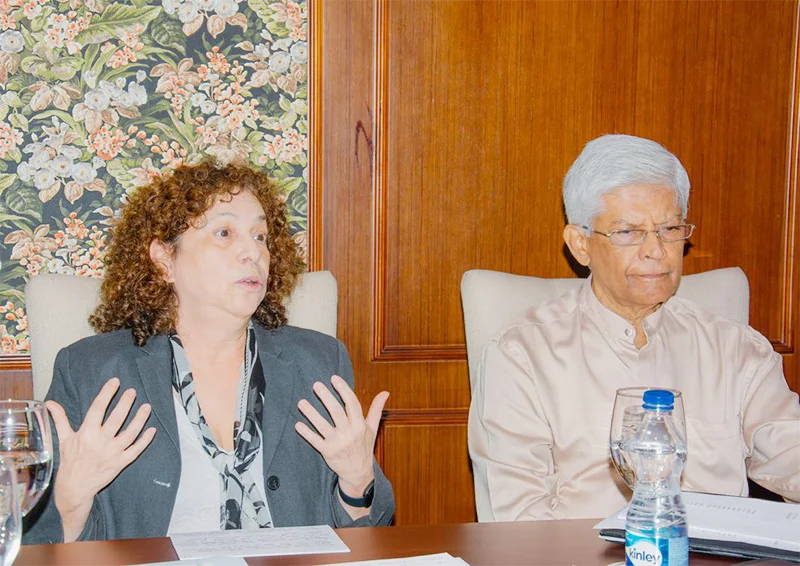
 Sri Lanka needs to take full stock of its current economic situation and use to the maximum the potential in its GSP+ facility for export sector growth. In the process, it should ensure that it cooperates fully with the European Union. The urgency of undertaking these responsibilities is underscored by the issues growing out of the recent US decision to sweepingly hike tariffs on its imports, though differentially.
Sri Lanka needs to take full stock of its current economic situation and use to the maximum the potential in its GSP+ facility for export sector growth. In the process, it should ensure that it cooperates fully with the European Union. The urgency of undertaking these responsibilities is underscored by the issues growing out of the recent US decision to sweepingly hike tariffs on its imports, though differentially.
These were principal ‘takes’ for participants in the Pathfinder Foundation’s Ambassadors’ Roundtable forum held on April 8th at the Colombo Club of the Taj Samudra. The main presenter at the event was Ms. Carmen Moreno Raymundo, Ambassador of the European Union to Sri Lanka and the Maldives. The forum was chaired by Ambassador Bernard Goonetilleke, Chairman, Pathfinder Foundation. The event brought together a cross-section of the local public, including the media.
Ms. Moreno drew attention to the fact Sri Lanka is at present severely under utilizing its GSP+ facility, which is the main means for Sri Lanka to enter the very vast EU market of 450 million people. In fact the EU has been Sri Lanka’s biggest trading partner. In 2023, for instance, total trade between the partners stood at Euros 3.84 billion. There is no greater market but the EU region for Sri Lanka.
‘However, only Sri Lanka’s apparel sector has seen considerable growth over the years. It is the only export sector in Sri Lanka which could be said to be fully developed. However, wider ranging export growth is possible provided Sri Lanka exploits to the fullest the opportunities presented by GSP+.’
Moreno added, among other things: ‘Sri Lanka is one among only eight countries that have been granted the EU’s GSP+ facility. The wide-ranging export possibilities opened by the facility are waiting to be utilized. In the process, the country needs to participate in world trade in a dynamic way. It cannot opt for a closed economy. As long as economic vibrancy remains unachieved, Sri Lanka cannot enter into world trading arrangements from a strong position. Among other things, Sri Lanka must access the tools that will enable it to spot and make full use of export opportunities.
‘Sri Lanka must facilitate the private sector in a major way and make it possible for foreign investors to enter the local economy with no hassle and compete for local business opportunities unfettered. At present, Lanka lacks the relevant legal framework to make all this happen satisfactorily.
‘Sri Lanka cannot opt for what could be seen as opaque arrangements with bilateral economic partners. Transparency must be made to prevail in its dealings with investors and other relevant quarters. It’s the public good that must be ensured. The EU would like to see the local economy further opening up for foreign investment.
‘However, it is important that Sri Lanka cooperates with the EU in the latter’s efforts to bring about beneficial outcomes for Sri Lankans. Cooperation could be ensured by Sri Lanka fully abiding by the EU conditions that are attendant on the granting of GSP+. There are, for example, a number of commitments and international conventions that Sri Lanka signed up to and had promised to implement on its receipt of GSP+ which have hitherto not been complied with. Some of these relate to human rights and labour regulations.
‘Successive governments have pledged to implement these conventions but thus far nothing has happened by way of compliance. GSP+ must be seen as an opportunity and not a threat and by complying with EU conditions the best fruits could be reaped from GSP+. It is relevant to remember that GSP+ was granted to Sri Lanka in 2005. It was suspended five years later and restored in 2017.
‘The importance of compliance with EU conditions is greatly enhanced at present in view of the fact that Sri Lanka is currently being monitored by the EU with regard to compliance ahead of extending GSP+ next year. A report on Sri Lanka is due next year wherein the country’s performance with regard to cooperating with the EU would be assessed. The continuation of the facility depends on the degree of cooperation.
‘A few statistics would bear out the importance of Sri Lanka’s partnership with the EU. For example, under the facility Sri Lanka benefits from duty free access in over 66% of EU tariff lines. The highest number of tourist arrivals in Sri Lanka in 2023 was from the EU’s 27 member states. Likewise, the EU’s 27 member states rank second in the origin of inflows of foreign exchange to Sri Lanka; with Italy, France and Germany figuring as the main countries of origin. Eighty five percent of Sri Lanka’s exports to the EU market benefits from GSP+. Thus, the stakes for the country are high.’
Meanwhile, President, In-house Counsel & Legal Advisor, The European Chamber of Commerce of Sri Lanka, John Wilson said: ‘GSP+ should be seen as not only an opportunity but also as a necessity by Sri Lanka in the current international economic climate. ‘Implementation of local laws is what is needed. Considering the pressures growing out of the US imposed new tariff regime, a good dialogue with the EU is needed.
‘Sri Lanka’s level of business readiness must be upped. Among the imperatives are: An electronic procurement process, Customs reforms, a ‘National Single Window’, stepped-up access to land by investors, for example, a clear policy framework on PPPs and reform of the work permits system.’
It ought to be plain to see from the foregoing that Sri Lanka cannot afford to lose the GSP+ facility if it is stepped-up economic growth that is aimed at. It would be in Sri Lanka’s best interests to remain linked with the EU, considering the aggravated material hardships that could come in the wake of the imposition of the US’ new tariff regime. Sri Lanka would need to remain in a dialogue process with the EU, voice its reservations on matters growing out of GSP+, if any, iron out differences and ensure that its national interest is secured.
Features
SENSITIVE AND PASSIONATE…
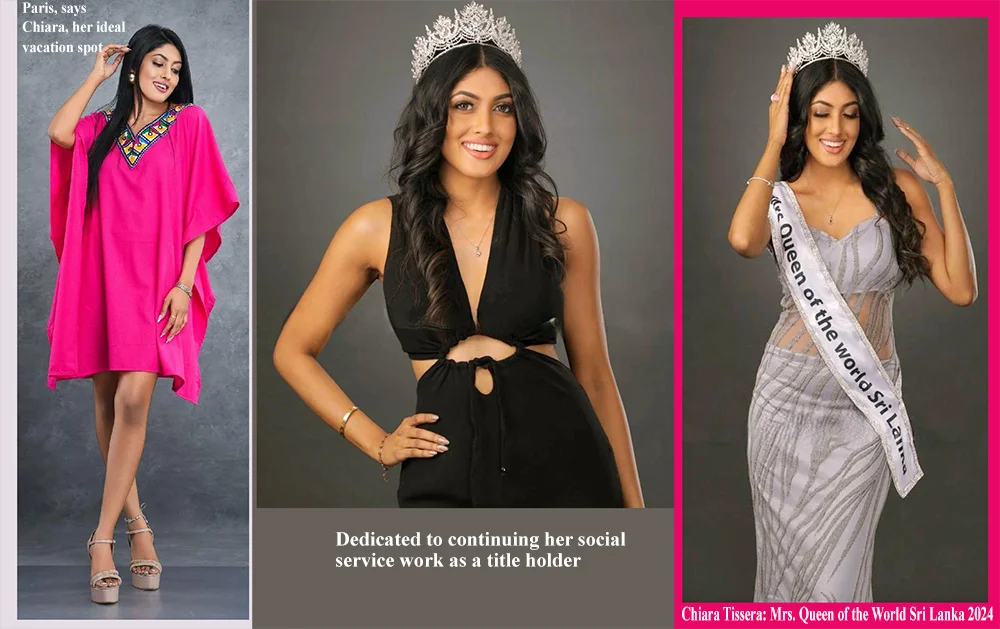
Chit-Chat
Chiara Tissera
Mrs. Queen of the World Sri Lanka 2024, Chiara Tissera, leaves for the finals, in the USA, next month
I had a very interesting chat with her and this is how it all went:
1. How would you describe yourself?
I am a sensitive and passionate individual who deeply cares about the things that matter most to me. I approach life with a heart full of enthusiasm and a desire to make meaningful connections.
2. If you could change one thing about yourself, what would it be?
Actually, I wouldn’t change a thing about myself because the person I am today, both inside and out, is the result of everything I’ve experienced. Every part of me has shaped who I am, so I embrace both my strengths and imperfections as they make me uniquely me.
3. If you could change one thing about your family, what would it be?
If there’s one thing I could change about my family, it would be having my father back with us. Losing him six years ago left a void that can never be filled, but his memory continues to guide and inspire us every day.
4. School?
I went to St. Jude’s College, Kurana, and I’m really proud to say that the lessons I gained during my time there have shaped who I am today. My school and teachers instilled in me values of hard work, perseverance and the importance of community, and I carry those lessons with me every day. I was a senior prefect and was selected the Deputy Head Prefect of our college during my tenure.
5. Happiest moment?
The happiest moment of my life so far has been winning the Mrs. Sri Lanka 2024 for Queen of the World. It was a dream come true and a truly unforgettable experience, one that fills me with pride and gratitude every time I reflect on it.
6. What is your idea of perfect happiness?
Happiness is a deeply personal and multifaceted feeling that often comes from a sense of contentment, fulfillment and well-being. For me, perfect happiness is in moments of joy, peace and accomplishments … and also being surrounded by my loved ones.
7. Are you religious?
Yes, I’m a very religious person. And I’m a firm believer in God. My faith guides me through life, providing strength, dedication and a sense of peace in every situation. I live by the quote, ‘Do your best, and God will do the rest.’
8. Are you superstitious?
I’m not superstitious. I believe in making my own decisions and relying on logic and faith rather than following superstitions.
9. Your ideal guy?
My ideal guy is my husband. He is compassionate, understanding and is always there to support me, no matter what. He’s my rock and my best friend – truly everything I could ever want in a partner.
10. Which living person do you most admire?
The living person I admire the most is definitely my mummy. Her strength, love and unwavering support has shaped me into who I am today. She is my role model and she inspires me every day with her wisdom and kindness.
11. Your most treasured possession?
My most treasured possession is my family. They are the heart of my life, providing me with love, support and strength. Their presence is my greatest blessing.
12. If you were marooned on a desert island, who would you like as your companion?
I would like to have my spouse as my companion. Together, we could make the best of the situation, supporting each other, sharing moments of laughter and finding creative ways to survive and thrive.
13. Your most embarrassing moment?
There’s quite a few, for sure, but nothing is really coming to mind right now.
14. Done anything daring?
Yes, stepping out of my comfort zone and taking part in a pageant. I had no experience and was nervous about putting myself out there, but I decided to challenge myself and go for it. It pushed me to grow in so many ways—learning to embrace confidence, handle pressure, and appreciate my own uniqueness. The experience not only boosted my self-esteem but also taught me the value of taking risks and embracing new opportunities, even when they feel intimidating.”
15. Your ideal vacation?
It would be to Paris. The city has such a magical vibe and, of course, exploring the magical Eiffel Tower is in my bucket list. Especially the city being a mix of history culture and modern life in a way that feels timeless, I find it to be the ideal vacation spot for me.
16. What kind of music are you into?
I love romantic songs. I’m drawn to its emotional depth and the way they express love, longing a connection. Whether it’s a slow ballad, a classic love song or a more modern romantic tune these songs speak to my heart.
17. Favourite radio station?
I don’t have a specific radio station that I like, but I tend to enjoy a variety of stations, depending on my mood. Sometimes I’ll tune into one for a mix of popular hits, other times I might go for something more relaxing, or a station with a certain vibe. So I just like to keep it flexible and switch it up.
18. Favourite TV station?
I hardly find the time to sit down and watch TV. But, whenever I do find a little spare time, I tend to do some spontaneous binge – watching, catching whatever interesting show is on at that moment.
19 What would you like to be born as in your next life?
Mmmm, I’ve actually not thought about it, but I’d love to be born as someone who gets to explore the world freely – perhaps a bird soaring across continents.
20. Any major plans for the future?
Let’s say preparing and participating in the international pageant happening in the USA this May. It’s an exciting opportunity to represent myself and my country on a global stage. Alongside this, I am dedicated to continuing my social service work as a title holder, striving to make a meaningful difference in the lives of others through my platform.
Features
Fresher looking skin …

 The formation of wrinkles and fine lines is part of our ageing process. However, if these wrinkles negatively impact appearance, making one look older than they actually are, then trying out some homemade remedies, I’ve listed for you, this week, may help in giving your skin a fresher look.
The formation of wrinkles and fine lines is part of our ageing process. However, if these wrinkles negatively impact appearance, making one look older than they actually are, then trying out some homemade remedies, I’ve listed for you, this week, may help in giving your skin a fresher look.
* Banana:
Bananas are considered to be our skin’s best friend. They contain natural oils and vitamins that work very perfectly to boost our skin health. Skincare experts recommend applying the banana paste to the skin.
Take a ripe banana and mash a quarter of it until it becomes a smooth paste. Apply a thin layer of the banana paste on your skin and allow it to sit for 15 to 20 minutes before washing it off with warm water.
* Olive Oil:
Olive oil works as a great skin protector and many types of research suggest that even consuming olive oil may protect the skin from developing more wrinkles. Olive oil contains compounds that can increase the skin’s collagen levels. Yes, olive oil can be used as a dressing on your salads, or other food, if you want to consume it, otherwise, you can apply a thin layer of olive oil on your face, neck and hands and let it stay overnight.
* Ginger:
Ginger serves to be a brilliant anti-wrinkle remedy because of the high content of antioxidants in it. Ginger helps in breaking down elastin, which is one of the main reasons for wrinkles. You can have ginger tea or grate ginger and have it with honey, on a regular basis.
* Aloe Vera:
The malic acid present in Aloe Vera helps in improving your skin’s elasticity, which helps in reducing your wrinkles. Apply the gel once you extract it from the plant, and leave it on for 15-20 minutes. You can wash it off with warm water.
* Lemons:
Lemons contain citric acid, which is a strong exfoliant that can help you get rid of your dead skin cells and wrinkles. Also, as an astringent and a cleansing agent, it helps to fade your wrinkles and fine lines. You can gently rub a lemon slice in your wrinkled skin and leave it on for 10-15 minutes. Rinse afterwards and repeat this process two to three times a day.
* Coconut Oil:
Coconut oil contains essential fatty acid that moisturises the skin and helps to retain its elasticity. You can directly apply the coconut oil, and leave it overnight, after gently massaging it, for the best results.
-

 Business4 days ago
Business4 days agoColombo Coffee wins coveted management awards
-

 Business6 days ago
Business6 days agoDaraz Sri Lanka ushers in the New Year with 4.4 Avurudu Wasi Pro Max – Sri Lanka’s biggest online Avurudu sale
-

 Features5 days ago
Features5 days agoStarlink in the Global South
-

 Business7 days ago
Business7 days agoStrengthening SDG integration into provincial planning and development process
-

 Business6 days ago
Business6 days agoNew SL Sovereign Bonds win foreign investor confidence
-

 Features2 days ago
Features2 days agoSri Lanka’s Foreign Policy amid Geopolitical Transformations: 1990-2024 – Part III
-

 Features5 days ago
Features5 days agoModi’s Sri Lanka Sojourn
-

 Midweek Review2 days ago
Midweek Review2 days agoInequality is killing the Middle Class



